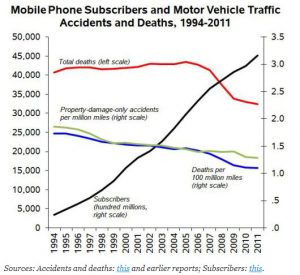 Philip Cohen, a sociologist at the University of Maryland, recently encouraged his readers to struggle with the topic of cell phones and their role in making the roads a safer or more dangerous place for those traveling in motor vehicles.
Philip Cohen, a sociologist at the University of Maryland, recently encouraged his readers to struggle with the topic of cell phones and their role in making the roads a safer or more dangerous place for those traveling in motor vehicles.
After mentioning “a powerful new documentary by Werner Herzog is making the rounds (presented by the phone companies), showing the consequences of accidents caused by phone-distracted driving,” Cohen goes on to explore what the data really shows. While I encourage you to read and consider his full post, it is important to note that between 1994 and 2011 mobile phone subscriptions increased more than 1200% while the “number of traffic fatalities per mile driven fell 36%.
So What?
So what faith is a place where hard questions are raised rather than answered. As a competent sociologist should, Cohen doesn’t draw conclusions from the limited data set (a skill we should all acquire and practice regularly!). Instead, he offers three possibilities for how this is possible:
Either (a) there is no connection between phones and accidents; (b) there is a positive causal connection, but it is swamped by whatever is making the roads safer; or, (c) cell phones are making the roads safer (say, by displacing other, more dangerous distractions, or by causing people to drive cautiously while they’re doing something they know is dangerous).
Questions:
- Which of the scenarios do you believe offers the best explanation? Why?
- Have you always assumed increased cell phone usage would make the roads a more dangerous place? If so, how does that assumption cloud or make more challenging your attempt to assess the probability of other possibilities?
- Are assumptions about causation or correlation causing you to not consider all of the data available to you when it comes to some aspect of your faith? If so, what can you do to begin to overcome this tendency?